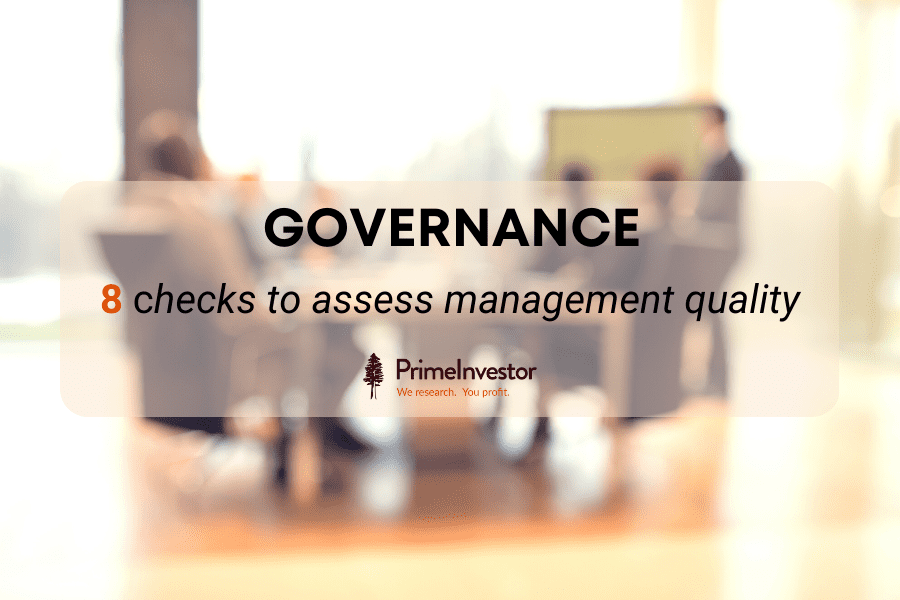The Adani saga (still continuing, I guess) brings forth the issue of governance, management quality, and other qualitative factors that many investors consider as essential check boxes. During the time I spent in CRISIL, ‘management quality’ would set a cap on ratings. But what is ‘management quality’?
It is an aggregation of many factors.

Defining management quality
Management primarily refers to the promoters. In cases such as HDFC, L&T and such, it would be the operating team that is managing the show as there are no promoters as we commonly understand.
It is important to understand why this factor, for me, overrides everything else. A company can only be as good as its management. In debt, we talk about ability and “willingness” to pay/repay. As an investor, one has no say in how the company is run or how the money is used. The management holds all the keys. I would prefer a good management with a modest business to a not-so-good management with a great business. Sooner or later, some disaster strikes.
Let me say a few words on the Adani saga. I can see that there is extreme polarization, with nationalism as the factor to divide opinions, rather than valuation, earnings, management, business, debt, and so on. Most of the people seem to be happy focusing on price and valuation rather than take a view on the soft factors.
The issue raised is not just about the credit default risk. It raises issues about the way promoters structure their holdings in a way that, often, the identities are masked. The main allegations are that there is an element of disguised promoter holding within the public holdings and if that were to be taken into account, it violates rules on listing and so forth. It also reduces the free-float and consequently, the weights in the index would stand reduced. The now-famous Hindenburg report also talks about valuations.
I can see around me that everyone is pointing out that the businesses are real, cash-generating and hence any default is unlikely. And then the same people who forwarded the Hindenburg report now turn buyers.
The important takeaway is that governance issues do not make a difference to the story, unless the issue changes the earnings or the book value. The rest are absorbed by the investors as par for the course. Yes, we will debate on the social media or in groups, but then, greed beckons. When there is a fifty percent fall (for example) there will be some who dip their toes, saying that prices may recover soon. At that time, price rules the mind. Governance simply becomes abstract, good to talk about, or put in official documents.
On the other hand, there will be a few who will not touch any stock that has governance issues. They think the investing universe is big enough and it is not important to own every stock. However, I suspect that they are in the minority and restricted to ‘non-institutional’ investors. Oftentimes, I have seen that institutional investors generally do not care much about it.
Checklist to assess management quality
I like to think that ‘management quality’ is important as far as portfolio selection is concerned. I have no control over price or earnings. However, I can try and minimize permanent loss of capital by keeping away when there is a hint of abnormality. A missed opportunity is better than losing money.
Here is my checklist of what boxes I like to tick, when it comes to management quality.
#1 Competence
Competence is reflected in the ROE and ROCE of a company over time. The first hurdle is to get it higher than the marginal cost of borrowing. If this is not visible, I start doubting a lot of things. For example, a return that comes from a million-tonne cement plant would be the same for everyone (barring marginal efficiency variations). However, if I were to pad up the capital costs, the ROCE and ROE would drop.
There are a zillion ways in which someone can take away cash from a running company! So, I like to use this as the first hurdle. But do note that I am not saying that someone who discloses an ROCE of 25% is better than someone who shows 15% ROCE. Each business would have its own strengths and market position.
#2 Dilution
I like to see managements that do not dilute the other investors by frequently issuing shares to promoters or by issuing shares to private investors. I dislike promoters who give themselves warrants (buy now pay later schemes). The correct way is to make a ‘rights’ issue, where every shareholder is given the same treatment.
I recall a famous case (Jagatjit Industries Ltd) where a promoter issued to himself shares with Differential Voting Rights. Those shares had higher voting rights than other shares. This is a terrible practice (common in the USA, the land that preaches governance to the world). I do not see any difference in the quality of money that anyone brings in.
#3 Accounting quality
Consistency is the hallmark of good accounting quality. Frequent changes in accounting practices, qualifications, delays, and so on are red flags. The auditor’s name also helps. Unusually high collection cheques on hand on balance sheet date, cheques not realized on the balance sheet date, (I fail to understand why a company should have cheques, in the days of electronic transfers!) are signs that do not pass the smell test.
#4 Corporate structure
I do not like companies with complex structures, with too many subsidiaries and cross holdings. Related Party Transactions is another orange zone. Understanding that ‘related party transactions’ table gives us an additional insight into the governance standards. Mere disclosure does not mean that governance is adequate. It is useful to figure out the why and what of any related party transaction.
#5 Reputation
Reputation with lenders and investors is another useful box to tick. When there are divided opinions, I find it safer to keep away.
#6 Capital Allocation
This is something that stirs up a lot of debate. Unrelated diversifications, acquisitions, and so on are caution signals. For surplus capital to be deployed, the incremental ROCE has to be as close to the existing business or better. Yes, I agree that it may take some time for an acquisition to turn beneficial, but it should not take decades.
These kinds of diversifications are often done to accommodate some family members or by professionally-run companies to create a serfdom. This is something I bother about, but not seen most investors being similarly bothered, so you may pardon my nit-picking.
#7 Political sensitivity
While some level of political appeasement is inescapable (pleasing local authorities who can create nuisance at your facilities) a very highly visible nexus is a strict no-no for me. There is an old saying which roughly means that if I dip my hands into the jaggery pot, I will not shake back what sticks to my hand. There is a tendency to dig deeper.
In today’s era, where licensing is restricted to doling out infrastructure at cheaper rates by the government, the need for any political nexus is far lower than what it was under the Industrial Licensing Policy of the yesteryears. License was an ‘entry barrier’! Today, it is limited to a couple of segments. It is our choice whether to look at those sectors or totally ignore them. Most of the sectors are capital-intensive and the revenue streams are vulnerable to policy changes by the politicians.
#8 Ownership
In family-run companies it is good to see as high a level of ownership as possible. One of my observations has been that when promoter holding falls below 30%, it is not a great sign. I do not have statistical evidence to prove this, but use it as my rule of thumb. The exceptions would be cases like HDFC, L&T, Infosys where there is no family rule nor family succession. Here, the track record speaks.
Well, I guess that these measures will shrink my investible universe. But it also makes my life easy by not bothering about a lot of noise. Dull and boring is generally good for long term wealth creation. It is amazing to see world-renowned investment experts seek value in price alone, without thinking about quality. I guess they have seen more of the investor behaviour than I have. Today, the world is forgiving when it comes to governance (except at seminars and lectures) and everything goes. So, as an investor, it is a choice you make.
The Adani story has a long way to go. The fight seems to be not about governance, but about continued access to capital markets. Growth is hungry for capital (debt and equity) and this report seems to have impacted that for now. I do not have an answer on what tomorrow will bring. What it does seem is that there is more to come, more legal battles and a sharper focus by lenders on trying to maintain asset quality.







1 thought on “Governance: 8 checks to assess management quality”
Nice checklist for governance. Thank you.
In the past many companies used to emphasize a great deal on value creation and EV was a good metric, reported regularly. That really takes of three points in your list.
What is your opinion on this because nowadays I don’t see companies using this as a measure of performance.
Comments are closed.